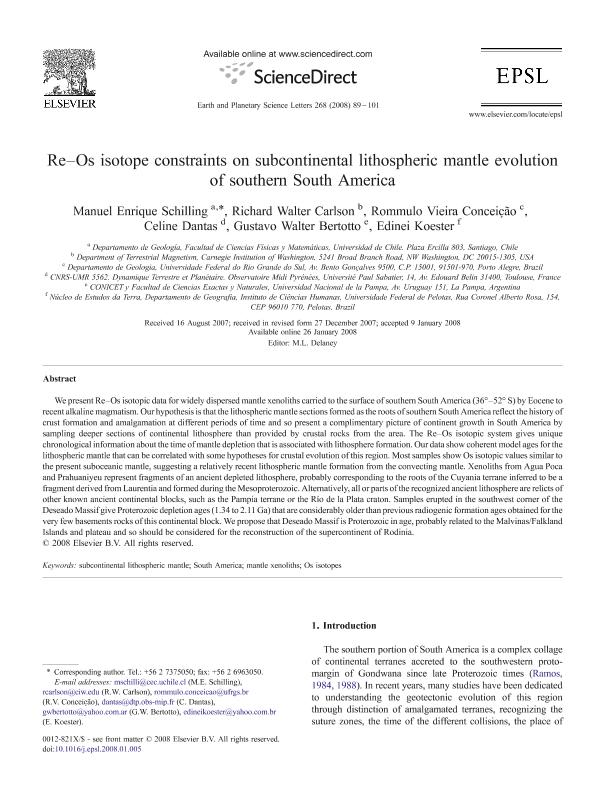Mostrar el registro sencillo del ítem
dc.contributor.author
Schilling, Manuel Enrique
dc.contributor.author
Carlson, Richard Walter
dc.contributor.author
Vieira Conceição, Rommulo
dc.contributor.author
Dantas, Celine
dc.contributor.author
Bertotto, Gustavo Walter

dc.contributor.author
Koester, Edinei
dc.date.available
2019-08-16T13:56:41Z
dc.date.issued
2008-04
dc.identifier.citation
Schilling, Manuel Enrique; Carlson, Richard Walter; Vieira Conceição, Rommulo; Dantas, Celine; Bertotto, Gustavo Walter; et al.; Re-Os isotope constraints on subcontinental lithospheric mantle evolution of southern South America; Elsevier Science; Earth and Planetary Science Letters; 268; 1-2; 4-2008; 89-101
dc.identifier.issn
0012-821X
dc.identifier.uri
http://hdl.handle.net/11336/81703
dc.description.abstract
We present Re-Os isotopic data for widely dispersed mantle xenoliths carried to the surface of southern South America (36°-52° S) by Eocene to recent alkaline magmatism. Our hypothesis is that the lithospheric mantle sections formed as the roots of southern South America reflect the history of crust formation and amalgamation at different periods of time and so present a complimentary picture of continent growth in South America by sampling deeper sections of continental lithosphere than provided by crustal rocks from the area. The Re-Os isotopic system gives unique chronological information about the time of mantle depletion that is associated with lithosphere formation. Our data show coherent model ages for the lithospheric mantle that can be correlated with some hypotheses for crustal evolution of this region. Most samples show Os isotopic values similar to the present suboceanic mantle, suggesting a relatively recent lithospheric mantle formation from the convecting mantle. Xenoliths from Agua Poca and Prahuaniyeu represent fragments of an ancient depleted lithosphere, probably corresponding to the roots of the Cuyania terrane inferred to be a fragment derived from Laurentia and formed during the Mesoproterozoic. Alternatively, all or parts of the recognized ancient lithosphere are relicts of other known ancient continental blocks, such as the Pampia terrane or the Río de la Plata craton. Samples erupted in the southwest corner of the Deseado Massif give Proterozoic depletion ages (1.34 to 2.11 Ga) that are considerably older than previous radiogenic formation ages obtained for the very few basements rocks of this continental block. We propose that Deseado Massif is Proterozoic in age, probably related to the Malvinas/Falkland Islands and plateau and so should be considered for the reconstruction of the supercontinent of Rodinia.
dc.format
application/pdf
dc.language.iso
eng
dc.publisher
Elsevier Science

dc.rights
info:eu-repo/semantics/openAccess
dc.rights.uri
https://creativecommons.org/licenses/by-nc-sa/2.5/ar/
dc.subject
Mantle Xenoliths
dc.subject
Os Isotopes
dc.subject
South America
dc.subject
Subcontinental Lithospheric Mantle
dc.subject.classification
Geología

dc.subject.classification
Ciencias de la Tierra y relacionadas con el Medio Ambiente

dc.subject.classification
CIENCIAS NATURALES Y EXACTAS

dc.title
Re-Os isotope constraints on subcontinental lithospheric mantle evolution of southern South America
dc.type
info:eu-repo/semantics/article
dc.type
info:ar-repo/semantics/artículo
dc.type
info:eu-repo/semantics/publishedVersion
dc.date.updated
2019-08-15T16:05:06Z
dc.journal.volume
268
dc.journal.number
1-2
dc.journal.pagination
89-101
dc.journal.pais
Países Bajos

dc.journal.ciudad
Amsterdam
dc.description.fil
Fil: Schilling, Manuel Enrique. Universidad de Chile; Chile
dc.description.fil
Fil: Carlson, Richard Walter. Carnegie Institution of Washington; Estados Unidos
dc.description.fil
Fil: Vieira Conceição, Rommulo. Universidade Federal do Rio Grande do Sul; Brasil
dc.description.fil
Fil: Dantas, Celine. Centre National de la Recherche Scientifique; Francia
dc.description.fil
Fil: Bertotto, Gustavo Walter. Consejo Nacional de Investigaciones Científicas y Técnicas. Instituto de Ciencias de la Tierra y Ambientales de La Pampa. Universidad Nacional de La Pampa. Facultad de Ciencias Exactas y Naturales. Instituto de Ciencias de la Tierra y Ambientales de La Pampa; Argentina
dc.description.fil
Fil: Koester, Edinei. Universidade Federal de Pelotas; Brasil
dc.journal.title
Earth and Planetary Science Letters

dc.relation.alternativeid
info:eu-repo/semantics/altIdentifier/url/https://www.sciencedirect.com/science/article/pii/S0012821X08000241
dc.relation.alternativeid
info:eu-repo/semantics/altIdentifier/doi/https://doi.org/10.1016/j.epsl.2008.01.005
Archivos asociados
